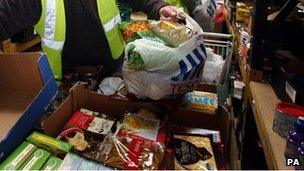Food bank reliance in the UK triples, says Oxfam
- Published

The study calls on the government to improve the monitoring and recording of data on food poverty
More than half a million UK people may rely on food banks, says a study by Church Action Poverty and Oxfam.
It blames benefit cuts, unemployment and the increased cost of living for the growth in hunger and poverty.
Oxfam said: "Cuts to social safety-nets have gone too far, leading to destitution, hardship and hunger."
The Department of Work and Pensions (DWP) said: "Our welfare reforms will improve the lives of some of the poorest families in our communities."
The report was backed by the Trussell Trust, the UK's biggest provider of food banks.
The trust said more than 350,00 people required help from its food banks during 2012, almost triple the number who received food aid the year before.
But the new study says that the true number may be more than 500,000 as the scale of the problem is not being effectively monitored.
It recommends the government improves monitoring and recording of data on food poverty.
'National disgrace'
The report attributes some of the rise in food bank reliance to "unemployment, increasing levels of underemployment, low and falling income, and rising food and fuel prices".
However, it added: "Up to half of all people turning to food banks are doing so as a direct result of having benefit payments delayed, reduced, or withdrawn altogether" and "changes to the benefit system are the most common reasons for people using food banks."
The report calls the amount of food poverty in the UK a "national disgrace".
It urges a parliamentary inquiry into the way changes in the benefits system - and the issues around benefits being paid correctly and on time - have affected food poverty.
It also calls on the government to raise the minimum wage and benefits in line with inflation, but warns that the current cuts and the introduction of the universal credit system will lead to more people turning to food banks.
The report also criticised changes in the eligibility rules for benefits, sanctions of jobseekers' allowance and delays in benefits being paid.
Jack, 25, is a single mother from Southend who visited food banks to feed herself and her son for six months.
She told the BBC they "were such a Godsend, I don't know what I would have done without food banks".
Most of the people she knew from food banks had struggled with benefits delays, sanctions or changes in eligibility rules.
'Emergency food'
The DWP said: "The benefits system supports millions of people who are on low incomes or unemployed so no-one has to struggle to meet their basic needs, and the vast majority of benefits are processed on time every day. "
The department defended its new universal credit system, which will be implemented nationally in October, saying it will simplify the benefit system and leave "three million households better off".
The report says that Universal Credit may unintentionally increase food poverty, as it will be paid monthly rather than fortnightly; there is a concern this will leave many running out of money for food by the end of the month and having to go without for several days.
The DWP says at least 85% of claims will be made online, although there are fears the process may be difficult for those on low incomes who have restricted access to the internet and may not be computer literate.
Church Action on Poverty CEO Niall Cooper said: "The safety net that was there to protect people is being eroded to such an extent that we are seeing a rise in hunger. Food banks are not designed to, and should not, replace the 'normal' safety net provided by the state in the form of welfare support."
Mary Creagh MP, Labour's Shadow Environment Secretary, said: "The UK is the seventh richest country in the world, yet we face a growing epidemic of hidden hunger with people increasingly unable to meet their family's basic needs.
"These shocking figures show the extent of poverty in the UK with half a million people now relying on emergency food parcels for help."
The Salvation Army welcomed the report, saying: "Food poverty and increasing reliance on emergency food is not sustainable for those trapped in the cycle of dependency."
Commissioner Clive Adams, territorial commander of the Salvation Army in the UK, said: "We are finding that the problems with food poverty are coming from the benefits system and delays in payments.
"So, today we are calling on Job Centres and Local Authorities to give people information about hardship payments and emergency payments as routine and see the needs of the individual."
- Published30 May 2013
- Published17 May 2013
- Published1 May 2013
- Published30 April 2013